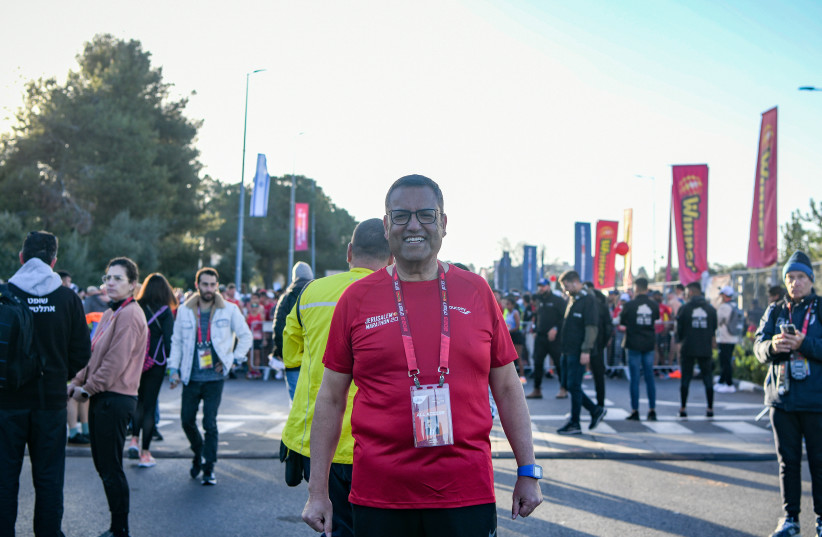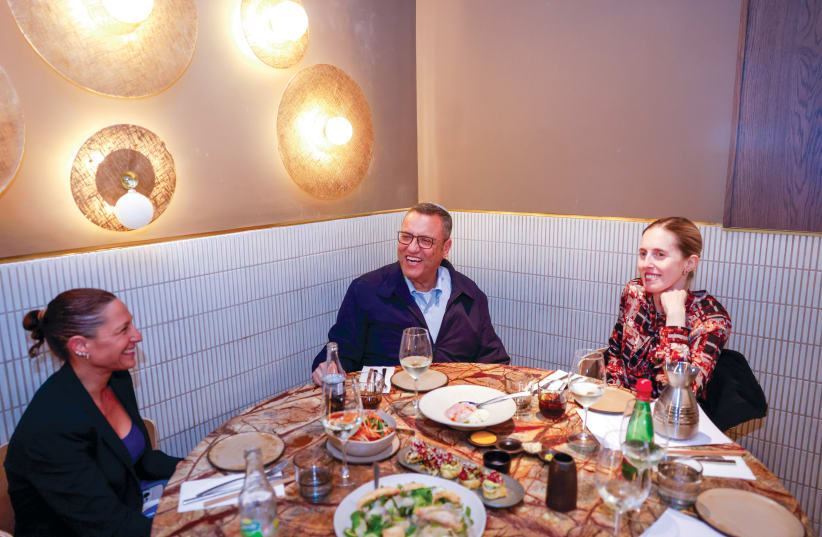In a political world often defined by grandiosity, Jerusalem Mayor Moshe Lion’s humility is a beacon of genuine connection.
Described by his staff as incredibly modest – exceptionally so – Lion possesses a ready smile and the “divine gift” of engaging effortlessly with individuals from all walks of life. Whether conversing with a foreign diplomat, the stoic guard stationed at the front door, or the approaching resident interrupting a meeting, he wields a magic that has united the Holy City and helped bridge the gap between our most diverse worlds.
“I answer my WhatsApps myself,” Lion said over an exquisite sushi lunch at the new Mizrahi Market restaurant on Bethlehem Road – his choice. “Everyone has my number. And if they don’t, they can get it.”
Lion, raised in Givatayim, moved to the capital and assumed leadership of the Jerusalem Development Authority. Although his 2013 mayoral bid was defeated by incumbent Nir Barkat, Lion remained in the city, learning its ins and outs. He then triumphed in the 2018 elections, securing the mayoral seat against pluralist Jerusalem city councilman Ofer Berkovitch.
Jerusalemites worried he would focus solely on the haredi stakeholders who helped secure his Safra Square post. Yet he succeeded in passing a budget that took everyone into account. Then came the COVID pandemic. Now Lion finds himself at the helm during an unprecedented conflict with Hamas.


Smartly dressed in a light blue button-down shirt and dark blue jacket, he chose the Mizrahi Market because it was bold enough to open during the conflict – and is succeeding in the shadow of war. He showed off his much-improved English in a conversation that veered between it and his mother tongue.
The security crisis could jeopardize the intricate stability Lion has diligently cultivated in Jerusalem.
“I invested a lot in building good relations with the residents of eastern Jerusalem, and I plan to continue investing,” Lion said. “There is no doubt that this does not give you insurance; that if you invest, you will not have violence or terror. But I still favor giving everyone the same chance to take advantage of everything this city offers.
“I think my work in this area is why we have quiet in the city during the war.”
Lion said he made sure that within a few days of Oct. 7, eastern Jerusalem’s residents returned to work despite complaints. Many Jewish residents – legitimately fearful in the massacre’s aftermath – did not want local Arab workers returning to their posts.
“First of all, you cannot generalize all Arab – or any other – citizens,” Lion said. “Second, you must continue allowing people to make a living. I believe as soon as someone has a salary, he will think twice before he engages in terror.
“I did not want these residents to think even for a minute that we were pushing them away or that we do not want them in the city.”
Lion’s statements seem in stark contrast to those made by his predecessor, Barkat, who has called to halt the use of Palestinian workers in Israel since Oct. 7 – workers from Gaza or the West Bank – and replace them with foreign workers. Barkat has not commented on Arab Israelis.
“Jerusalem is not Judea and Samaria,” Lion stressed. “Judea and Samaria is not Gaza. Even more so, Jerusalem is not Gaza.”
Nevertheless, Lion emphasized his investment in and close collaboration with security forces to safeguard the city. After Oct. 7, he promptly instituted neighborhood security units to collaborate with the police in case of emergencies. The city has twice the number of police officers compared to Tel Aviv.
Lion also ensured the firing of a handful of municipal workers who had posted support of the massacre on social media.
“Anyone who engages in terror will be dealt with with a strong hand. I have zero tolerance for violence, including verbal violence,” he said.
“The most challenging city in the world” is how Lion described the capital through sips of Coke Zero. Clearly passionate about Israel’s capital – ayn alav (“there is none better”) – he preferred conversing about Jerusalem rather than focusing on his meal.
The mayor was going from lunch to the funeral of a soldier who fell in Gaza. He has attended the funerals of all 60 Jerusalem soldiers killed in the war.
A Jerusalem revolution
Beyond fostering unity, Lion has transformed Jerusalem into a bustling construction zone – however, one that is meticulously organized, he assured us. After half a decade, the results of all those cranes are finally beginning to materialize, he said.
“Of course, people complain about all the construction. But if we want Jerusalem to grow and accommodate more residents, we have to build.”
For the 15 years before he took office, only around 2,000 new apartments were built in the city a year, so people left. Today, upward of 7,000 are constructed. Lion was faced with two choices: build these apartments in green spaces or embark on an urban renewal initiative. He chose the latter.
“Jerusalem is undergoing a revolution,” Lion asserted. “We’re constructing numerous apartments and simultaneously investing in the light rail. I envision residents stepping out of their front doors and seamlessly boarding the light rail. Additionally, we’re erecting millions of square meters of business towers.” All residential plans include kindergartens, parking, and community centers.
However, Jerusalem is at risk of losing some of its prized, sleepy charm in the process.
Regarding the light rail’s Blue Line and whether it will run down Emek Refaim Street – a location German Colony residents have protested will ruin the charming central byway – he again affirmed that after years of fiery debate, construction will begin there within the next year.
Another wrinkle: In the US, citizens can contact their state representative when problems arise. In Jerusalem, it’s often unclear whom to turn to. Acknowledging this, Lion advised that he has expanded the 106 hotline expressly for this purpose. He also recommended starting with the local council, and then turning to the municipality.
THE MAYOR has become best known for cleaning up the streets of Jerusalem – for many, few things are as welcome as the sound of sanitation trucks on their street on Saturday night, collecting the Shabbat detritus. The Holy City is now considered the cleanest in the country. However, he did that at the beginning of his term.
So, what now?
“Next, I plan to improve our infrastructure: the sidewalks, potholes in the streets, community gardens,” he said.
Lion has taken it upon himself to visit nearly every community park and garden, assessing their needs and initiating a comprehensive renovation plan. He completed Sacher Park near the neighborhoods of Kiryat Wolfson and Nahlaot, with its dynamic playground. By Passover, renovations are expected to be completed on the Wohl Rose Park, for which roses are being specially harvested in the North.
“This is my job,” he said with a smile. “I know every park in this city.”
Exercise and the outdoors keep the mayor calm and centered enough to do the job that never ends. Shortly after taking office, Lion lost a dramatic amount of weight. He has never shared the secret of how he did it, but said he continues to eat right and to prioritize fitness.
He sees being healthy as integral to his success. During a trying time when many of us are indulging in ice cream while watching Netflix, Lion maintained, “I have to take care of myself so I can take care of all of you.”
When asked how he balances it all and keeps the cool head required, he shared that he takes the time to de-stress and relax on Shabbat. Weekdays and weeknights belong to the city.
Lion has participated in the Jerusalem Marathon 10K many times. The country was forced to cancel it in 2020 due to the pandemic. Will it call off the run for the war?
“It’s looking positive” that the race will happen on March 7, Lion said.
He said that not only do residents really want – or maybe even need – the race, but canceling it would be rewarding terrorism. Instead, he would run it as a show of unity, giving reservists and their families free entry.
So, what’s next for the mayor? He hopes for another term.
Municipal elections are set to take place on February 27. Lion said he is confident he will be given another five years to invest in Jerusalem.
Will he work his magic? We’ll let you know when the votes are counted. ■
What's new in In Jerusalem?
- This week in Jerusalem: For your health
- A guide to Jerusalem real estate, construction boom, and traffic
- How Mayor Moshe Lion is transforming Jerusalem and preserving stability
- October 7 massacre survivor displays artwork in new exhibit
- Jerusalem's Rehavia neighborhood: A tapestry of culture, timeless landmarks
- Lori Palatnik: Giving newlywed IDF soldiers hope and a home to return to
- Eser: A restaurant where the vibes are as good as the food - review
- Grapevine: Celebrating Walter
- Jerusalem highlights January 12-18
